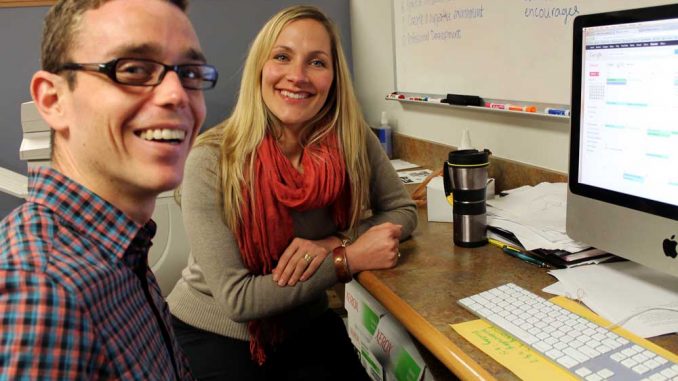
Nationwide, 6.7 percent of college students identify as gay, lesbian or bisexual according to National College Health Assessment data. A new campus program, aimed at making students who identify with that segment feel more comfortable, has recently expanded.
For the past three years, Residential Life has been running a program called Safe Zone Ally, which trains its resident assistants and other residential staff to be confidants for LGBT students and their allies. At the end of Fall 2012, this program, in correlation with the Wellness Resource Center, opened this opportunity to faculty and staff.
Director of the Wellness Resource Center Kimberly Chestnut, Residential Life Coordinator Steve Dexter, Resident Director Temple Jordan, Resident Director Nu’ Rodney Prad and Graduate Sexuality and Education Intern Joshua Klein are the founders and administrators of Safe Zone training.
“I’m really excited about the program. We are really pleased to be able to offer it and look forward to just doing it as often as it’s needed to the best of our abilities,” Chestnut said.
Once a student or faculty member is certified as safe zone trained, a marker is placed outside of his or her door, making those marked as open vessels for confidential conversation with students in need.
Temple College Democrats President and Queer Student Union Events Coordinator Dylan Morpurgo was a participant in the program when he was involved in Residential Life through the Residence Hall Association.
“It was a really great learning experience for the participants because it was a mix of members of the LGBT community and allies,” Morpurgo, a junior political science major, said. “Everybody was able to feed off of each other and learn from each other.”
Dexter said the program is orchestrated through a four-hour-long training course where students are exposed to the terminology and scenarios that LGBT students could experience. A quiz is administered at the end of the session, which must be passed in order to be certified.
Dexter said that high attendance at the training sessions is a contributing factor toward the decision to expand the program.
Morpurgo said the high attendance isn’t surprising and neither is the opening of classes to faculty and staff.
“It is a great resource for the Residential Life community, but we all know that the students who live in university housing are actually a small percentage of the student population,” he said. “Members of the LGBT community are not just living in dorms. Obviously, we are taking classes and we are dealing with faculty on a daily basis, so it makes sense that the program expanded.”
In accordance with Morpurgo’s opinions, the first couple of classes were full, Chestnut said. Her only concern is that the program eventually will not have enough staff to cover the growing demand.
“It is something that we will be tracking,” she said. “As of right now, we aren’t looking for new staff.”
Regardless of the worries about demand, Chestnut and Dexter said they are pleased with the popularity of the program.
“There is a lot of interest, so we are excited about that and we certainly hope students feel like it’s making a positive impact during their time here on campus,” Chestnut said.
Faculty can register for the program through Human Resources and students involved in Residential Life can do so through their employer. Classes are created based upon instructor availability and current demand, Chestnut said.
Cindy Stansbury can be reached at cindy.stansbury@temple.edu.



Be the first to comment